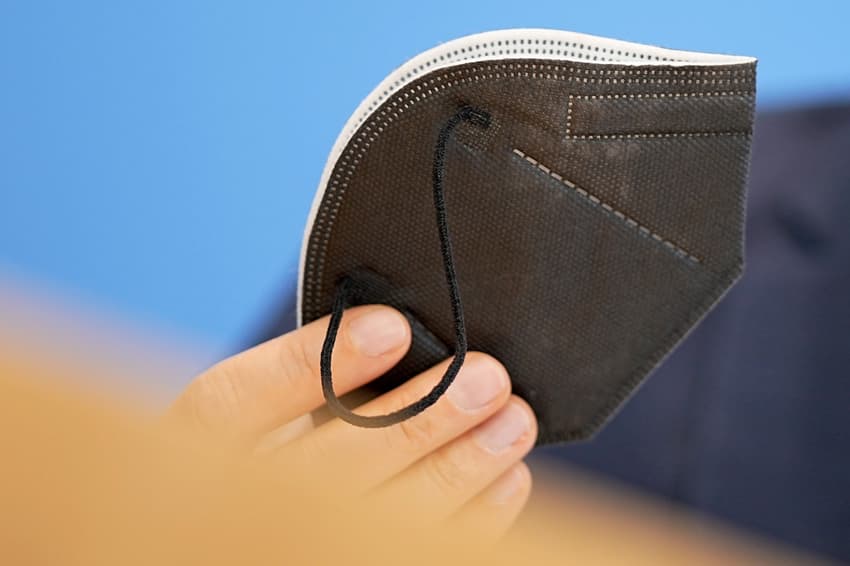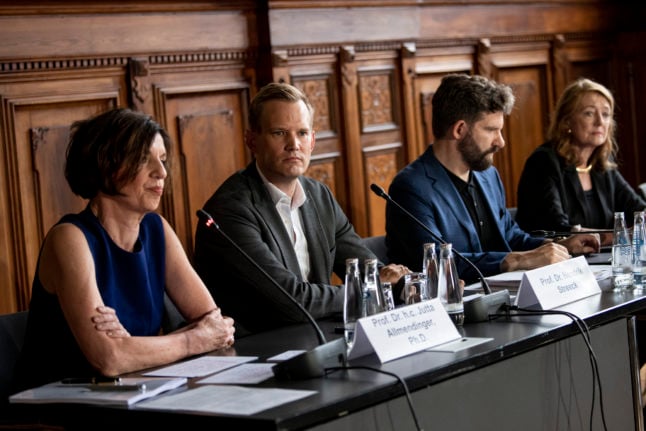How useful are Germany's Covid restrictions?

Protective measures such as wearing a mask correctly and lockdowns can be effective in the fight against Covid, an expert commission in Germany has found. But many questions remain unanswered.
The council of experts spent months evaluating the effects of measures imposed by the German government to help slow down the spread of Covid-19.
In the presentation of their findings on Friday, the panel said that measures like mask-wearing have had an effect, and can continue to be helpful against coronavirus.
The council said masks could be "an effective instrument", but that there are limitations.
"An ill-fitting or not tight-fitting mask has a reduced to no effect," said the council.
If masks are made compulsory again in the future, this should only apply indoors, because the risk of infection is higher there, the report said.
However the experts added: "A general recommendation to wear FFP2 masks cannot be derived from the data so far." Virologist Hendrick Streeck, who is on the panel, said that a "separate commission should look into this".
READ ALSO: Germany's current Covid mask rules
On lockdowns, the experts said the usefulness of this measure depended on the infection situation.
"When only a few people are infected, lockdown measures have a significantly stronger effect," the report said. The longer a lockdown lasts, and the fewer people are willing to support the measure, the lesser the effect, experts added.
Similar to to lockdown measures, contact tracing was also found to be effective in the early phases of the pandemic.

Members of the Covid expert panel Jutta Allmendinger, Hendrik Streeck, Harald Wilkoszewski and Helga Rübsamen-Schaeff speak on Friday. Photo: picture alliance/dpa | Fabian Sommer
The report authors also said that the success of access restrictions, such as the 2G/3G measures (which mean people have to be vaccinated, recovered or tested to enter a public venue), depended on when people had had their jab or had been infected with Covid.
"The effect of 2G/3G measures is high with current variants in the first weeks after booster vaccination or recovery," the report says. However, the protection against infection decreases significantly over time.
In the current phase of the pandemic, it's difficult to assess how useful these rules are, said the council. They recommended that in future, tests should be recommended as a condition of entry, regardless of vaccination status.
Meanwhile, the evaluation concluded that risk communication in Germany was poorly used and that the information campaign to the public could have been better designed.
No statement on vaccinations
There are measures on which the committee did not make any statements, including vaccinations. Virologist Streek said that was the task of the Standing Commission on Vaccination (STIKO).
The experts were also weren't clear on the controversial topic of school closures. Their effectiveness is "still open, despite biological plausibility and numerous studies", the report said. The panel called for more studies on school closures.
READ ALSO: German Health Ministry lays out autumn Covid plan
The researchers said that they struggled to evaluate some measures due to poor data, and urged authorities to adopt better methods and practices on that front.
"We have a poor data situation," said virologist Streeck.
As Germany is preparing for possible Covid waves in autumn, the Health Ministry will be looking at the report closely.
But Greens' health expert Janosch Dahmen said the findings were of limited significance.
"The report provides supplementary evidence, but by no means a conclusive assessment of the effect of Covid protection measures," said Dahmen.
The completion of the report, which should have been published on June 30th, was delayed.
In the run-up, the head of the council of experts, Stefan Huster, dampened expectations for the report.
"Anyone expecting a list with a plus or a minus behind all the individual measures for 'effective' or 'not effective' will be disappointed," Huster told Spiegel. "Our perspective is more fundamental and looks at the structures, in terms of being well prepared for a pandemic."
The panel, which included scientists and researchers in various fields, was commissioned by the German government to carry out the research.
Comments (2)
See Also
The council of experts spent months evaluating the effects of measures imposed by the German government to help slow down the spread of Covid-19.
In the presentation of their findings on Friday, the panel said that measures like mask-wearing have had an effect, and can continue to be helpful against coronavirus.
The council said masks could be "an effective instrument", but that there are limitations.
"An ill-fitting or not tight-fitting mask has a reduced to no effect," said the council.
If masks are made compulsory again in the future, this should only apply indoors, because the risk of infection is higher there, the report said.
However the experts added: "A general recommendation to wear FFP2 masks cannot be derived from the data so far." Virologist Hendrick Streeck, who is on the panel, said that a "separate commission should look into this".
READ ALSO: Germany's current Covid mask rules
On lockdowns, the experts said the usefulness of this measure depended on the infection situation.
"When only a few people are infected, lockdown measures have a significantly stronger effect," the report said. The longer a lockdown lasts, and the fewer people are willing to support the measure, the lesser the effect, experts added.
Similar to to lockdown measures, contact tracing was also found to be effective in the early phases of the pandemic.

The report authors also said that the success of access restrictions, such as the 2G/3G measures (which mean people have to be vaccinated, recovered or tested to enter a public venue), depended on when people had had their jab or had been infected with Covid.
"The effect of 2G/3G measures is high with current variants in the first weeks after booster vaccination or recovery," the report says. However, the protection against infection decreases significantly over time.
In the current phase of the pandemic, it's difficult to assess how useful these rules are, said the council. They recommended that in future, tests should be recommended as a condition of entry, regardless of vaccination status.
Meanwhile, the evaluation concluded that risk communication in Germany was poorly used and that the information campaign to the public could have been better designed.
No statement on vaccinations
There are measures on which the committee did not make any statements, including vaccinations. Virologist Streek said that was the task of the Standing Commission on Vaccination (STIKO).
The experts were also weren't clear on the controversial topic of school closures. Their effectiveness is "still open, despite biological plausibility and numerous studies", the report said. The panel called for more studies on school closures.
READ ALSO: German Health Ministry lays out autumn Covid plan
The researchers said that they struggled to evaluate some measures due to poor data, and urged authorities to adopt better methods and practices on that front.
"We have a poor data situation," said virologist Streeck.
As Germany is preparing for possible Covid waves in autumn, the Health Ministry will be looking at the report closely.
But Greens' health expert Janosch Dahmen said the findings were of limited significance.
"The report provides supplementary evidence, but by no means a conclusive assessment of the effect of Covid protection measures," said Dahmen.
The completion of the report, which should have been published on June 30th, was delayed.
In the run-up, the head of the council of experts, Stefan Huster, dampened expectations for the report.
"Anyone expecting a list with a plus or a minus behind all the individual measures for 'effective' or 'not effective' will be disappointed," Huster told Spiegel. "Our perspective is more fundamental and looks at the structures, in terms of being well prepared for a pandemic."
The panel, which included scientists and researchers in various fields, was commissioned by the German government to carry out the research.
Join the conversation in our comments section below. Share your own views and experience and if you have a question or suggestion for our journalists then email us at [email protected].
Please keep comments civil, constructive and on topic – and make sure to read our terms of use before getting involved.
Please log in here to leave a comment.